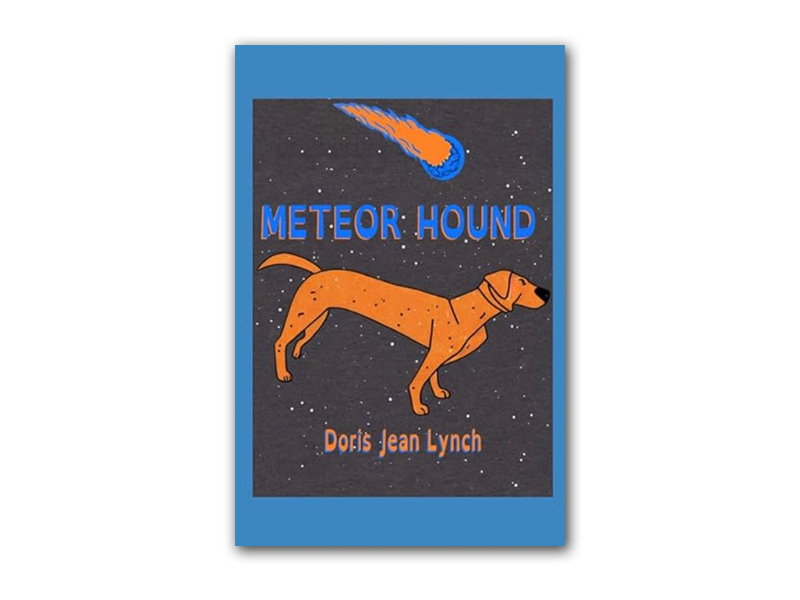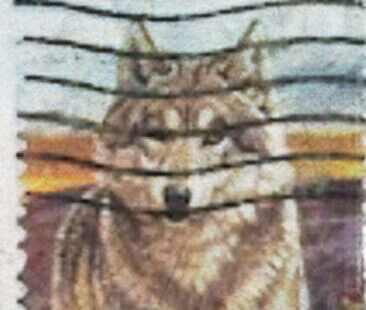
Book Review: Meteor Hound
By Doris Jean Lynch
Illustrated by Thom Gillespie
Published by MediaJazz
Bloomington, Indiana, USA
2023, Paperback, 68 pages
ISBN: 978-0-99854-331-4
$14.00 USD paperback / $2.99 USD e-book
Available through Amazon
Reviewed by Rich Youmans

Doris Lynch has been writing haibun for a little over a decade now, publishing widely and earning several awards (including the Grand Prix in the 2017 Genjuan International Haibun Contest). She’s now assembled some of her best work into her first collection—or maybe I should say collections, since in a way Meteor Hound’s three sections could just as easily have been published as individual chapbooks. The first section focuses on her time living in Alaska, the second emphasizes her fascination with nature and the cosmos, and the third mostly revolves around the idea of “transformations,” from birth to intimations of mortality (hers and the planet’s, thanks to climate change). Underlying everything, though, is Lynch’s attunement to the many connections—with one another, with our ancestors and immediate family, with all of nature and the cosmos—that, like the stars that form the constellations, provide meaning and a framework to our existence.
Lynch currently lives in Bloomington, Indiana, where she worked for many years as a librarian while also writing fiction and poetry (and earning three Indiana Arts Commission fellowships). Earlier in her life, though, she, her husband, and their growing family lived and worked in the small village of Kivalina, Alaska. Many of Lynch’s finest published haibun have recalled episodes from that time, and the book opens with a dozen of them. Grouped under the heading “Alaska & Other Adventures,” they offer some fascinating glimpses into the largest and most sparsely populated U.S. state. Lynch takes the reader on board clattering Cessnas that carry both mail and passengers; across the tundra’s “ivory brilliance” that she traverses in snowmobiles or trods in mukluks (while carrying her toddler daughter inside her parka); and into a small village where she learns the language, customs, and local life.
Entering the Alaskan post office, located in Ethel Swan’s living room, I greet the village ladies, who sit cross-legged on the floor sewing mukluks. “Come,” Alice says, “Let’s see that little beauty inside your parka.” As the room’s warmth surrounds us, Kristen wakens, pokes her head out. I stoop so the ladies can coo to her in Inupiaq. We share news about the weather and animal sightings—Enok spotted a musk ox on the island—if only the channel were frozen already. Ethel’s sons return from hunting and head to the side room for butchering.
(from “Post Office Beneficence”)
Lynch also captures some of the natural aspects of the region, such as the “singing” of sea ice (in which the “sawing, grinding, rasping of the ice sounds as if a giant creature beneath it is gathering energy to burst through to freedom”) or the “expansive” silence of the tundra plains that is so deep, the emergence of any sound feels like a discovery. One of the book’s finest haiku powerfully captures this sense of being in a realm so far apart:
tundra walking feeling the planet's wobble with each step(from “Village Mail Plane”)
I’m not sure what the “other adventures” referred to in the section’s title were, since the only non-Alaska haibun is one about a series of lake-hoping side trips that the author and her husband took on their way to that state. If I had to guess though, it would be more about her own inner journey into the heart of the local Inupiat community. Lynch describes how her neighbor, Oscar Swan, invites her and her husband to language classes, where the lessons in Inupiaq are punctuated by local delicacies (such as whale oil donuts, which taste like “the sea brushed with the sweetness of snow”). How Ethel Swan, the local postmaster, provides Lynch’s family with a gift of caribou meat. How most if not all of the village assembles for New Year’s Eve in the community hall, for “Eskimo games” such as knuckle walking (where young men walk across a cement floor while balanced on their toes and knuckles, ugh) and dances set to the rhythms of skin drums. Most of all, she captures a region where people seem to look out for one another, as if they were family.
Underpinning it all is Lynch’s own story of family. By the end of their stay in Alaska (which, according to the book’s jacket, lasted seven years, although that’s not clear from the haibun), Kris is no longer a toddler; she’s a young girl eager to see Alaska’s wonders, and Lynch has given birth to a second child, Cody. The section ends with the quiet, meditative “Season of Snow and Milk” (the Genjuan Grand Prix winner), a touching, existential tribute to family. It begins with Lynch nursing her baby in the hours before dawn while a snowplow clears the streets. “The driver, the baby, and I seem to be the only ones awake in this white world,” she writes.
We exist outside of time. No moon, no stars, only white flurries float before the plow’s headlights. In the next room, my husband and daughter sleep, leaving an empty spot on the family bed.
at daylight tiny fingers strum my breast— alpine glow
This existential moment leads in well to the next section, “Travels & Other Pilgrimages.” As the title suggests, the haibun in this section take readers to some of the places where Lynch has lived or visited in the contiguous 48 states—she recounts square dancing in a Kentucky state park, nighttime drives along the Pennsylvania Turnpike, camping in Washington State’s Hoh Rain Forest, or just stargazing in a local state park with her dog, Mr. Darcy (the “meteor hound” of the book’s title). Beneath them all, though, lies an abiding interest in the mystery of the cosmos and a deep affinity for the natural world. The word “pilgrimage” was not chosen lightly in the section’s title; there’s a sense of a spiritual quest in these pieces, a desire to shed the ego and connect with all living things.
The first haibun, “Metamorphosis at Midnight,” sets the tone with a directive to the reader: “Step outside tonight and let the darkness enfold you. Stand where you can reach the closest stars and know someday the farthest ones will be yours to cup as well.” Lynch’s appreciation for stars can be seen throughout this section (9 of the 14 haibun contain references to the celestial, with the Orion constellation a favorite go-to image). She then bring her focus back down to earth:
See apples on the bough? Experience the fruit’s firmness, skin-gloss, rotundity. Think color and stillness; remember breathing can bridge the distance between you. Exude the scent of McIntosh. Command the umbilical stalk to tear and its fruit to fall. As with any meditation, trace your way back; slowly, carefully inhabit your once familiar body.
still sending light dead stars Bison sky
Lynch’s charge to essentially inhabit the apple recalls Basho’s advice to his disciple Doha, to learn the pine from the pine. The haiku, however, sends the reader’s gaze back to the heavens and brings up another of this section’s motifs: the connections that span eons. Whether it’s starlight in a “Bison sky”—a reference to the Lakota people’s name for what we now call the Orion constellation—or exploring the ancient ruins in Chaco Canyon, Lynch is attuned to the echoes of centuries gone, to our ties with those who came before. Here’s an excerpt from the aptly titled “Continuum”:
The sun’s last rays pierce through what was once a window, reddening a petroglyph wall. In the gathering darkness, I distinguish handprints—so much like mine—reaching toward the night’s first stars.
racing time racing distance just another mesa shadow
The third section, “Birth & Other Transformations,” takes the reader from childbirth (specifically, that of Lynch’s first child, Kristen) to intimations of mortality both human and planetary. Many of the haibun revolve around family, including a meditation on what it means to have given birth to a new life:
I realize that I have brought you into this world only to allow you to die. Yet, how humble my hands are as they cradle your precious head. All your future days, everything in life you touch, taste, and love here before me now, dandelion fluff that will someday spiral away.
curl of one fallen eyelash upon my breast(from “First Touch”)
Other haibun touch on the death of a brother and the loss of a father to Alzheimer’s. The last leads into haibun where Lynch contemplates the death of loved ones as well as her own ultimate passing. “In the Wee Hours” finds her reversing her previous attempt to inhabit her body:
Between midnight and dawn, my body practices leaving. Using sheets for sails and the bedframe for a prow, my body rehearses its last goodbye. Stars and moon lose their sway, locked doors no longer contain me, and our bedroom windows become as porous as air.
every quarter hour the cuckoo escapes again
The two final haibun in this section, “Climate Grief” and “Tourists of a Cold Apocalypse,” focus on the effects of global warming. They feel almost like a coda—once our lives end, what remains will be our legacy and what we’ve done to the planet. Interestingly, “Tourists” leaves the reader with ice floes similar to what might have been seen in Alaska, all the way back at the beginning of this book. Here again, in a region where the land shivers and quakes, community prevails—”We reach for each other, hang on with all our strength. Welcome the babies, the frail old couple to burrow between us.” Except now that community is faced with a rising sea and their own guilt, their “mouths open, begging for forgiveness, mercy”). The final haiku augers the apocalypse to come:
hail hammers thousand year ice mammatus clouds
It’s a bit ironic that for a book beginning and ending with regions of ice, the title references a heavenly fireball. It put me in mind of Frost’s famous “Fire and Ice” poem—not exactly a cheery way to end a book. However, I didn’t really have a feeling of doom after finishing Meteor Hound. Looking again at the book’s title poem, I found myself drawn to these lines:
Breathing clean winter air, I scan ten times more stars than I can see in town. Beneath them, everything comes into perspective. War, famines, disasters come and go; humans work, dance, make love, share stories. But the stars endure, and somehow reassure.
I’m not sure if Lynch chose Meteor Hound as the book’s title specifically to offer such reassurance, but if she did, it at least worked for me. Tonight, I might just go outside and lift my head skyward. Maybe even search for Orion.
About the Reviewer

Rich Youmans lives on Cape Cod with his wife, Alice. His books include All the Windows Lit (Snapshot Press, 2017) and Head-On (Red Bird Chapbooks, 2018). He is also the co-author, with Roberta Beary and Lew Watts, of Haibun: A Writer’s Guide (Ad Hoc Fiction, 2023).
